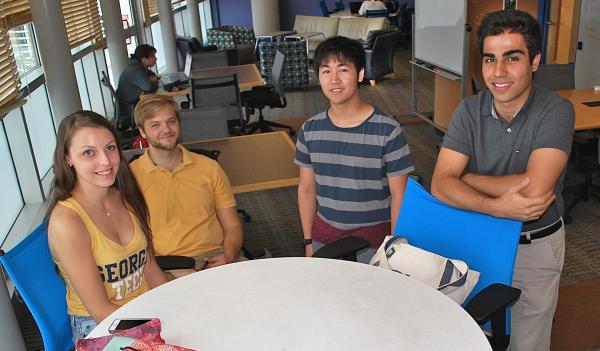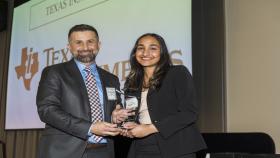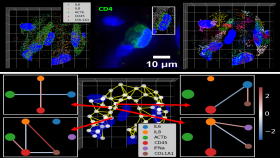You’ll find them five nights in the Learning Commons on the fourth floor of the Whitaker Building, home of the Wallace H. Coulter Department of Biomedical Engineering (BME) – students helping students, sharing knowledge, a rising human tide trying to lift all boats.
Welcome to FOCUS (for Facilitated Open Collaborative Undergraduate Study), a new tutoring program introduced this semester.
“It’s all part of the BME Learning Commons movement, as we like to call it,” says Joe Le Doux, associate chair of undergraduate learning and experience in the Coulter Department. “We have a large student body, and we want our students to help each other out. “
FOCUS is an accurate acronym, because the point of the program is to focus on specific academic subject areas each night, according to the BME undergraduate students who comprise the inaugural tutoring team, and who are filling an important gap.
“When you get deeper into your concentrated major specific courses, it’s harder to find tutors,” explains Nima Mikail, a third-year student. “So it’s nice to have a group of like-minded individuals who already took some of these classes that can help students who might be struggling.”
So, Sunday through Thursday, from 7 p.m. to 9 p.m. (“Prime study hours,” says Le Doux), students can just drop in to the BME Learning Commons and ask for help from the tutor working that night.
Mikail and his fellow FOCUS tutors are like a team of academic super friends, each with a specific super academic power, or focus area.
Mikail teaches biostatistics and human physiology. Gloria Bowen teaches human physiology and conservation principles. Ana Gomez specializes in systems physiology and conservation principles. Daniel McNavish primary areas are biostatistics, biomechanics and cell physiology. Jimmy Zhou focuses on biostatistics, biosystems modeling and cell physiology.
But they aren’t constrained by those courses, and sometimes the student tutors are facilitating as much as tutoring.
“I can easily take a step back and just guide the group,” says Zhou. “Sometimes, the students end up just figuring out the problems by working together without any of my input.”
It’s the collaborative, drop-in approach to the FOCUS tutoring program that sets it apart from something like, say, the 1-to-1 Tutoring program offered through Georgia Tech’s Center for Academic Success. That program requires a student to make an appointment with a tutor. The FOCUS tutors have worked in that program, too, and recognize the distinct strengths of both. But they’re intentionally trying to do something different with FOCUS.
“I like the group dynamic of FOCUS,” says Bowen. “Students are actually encouraged to work together to figure things out, versus us just telling them what to do. One on one can be a little intimidating sometimes – it’s just you alone with a tutor. FOCUS is a great way to collaborate with other people.”
The FOCUS tutors see the experience as a win-win, a kind of enlightened self-interest. Bowen, for example, has an interest in teaching, so she sees this as a way to help prepare for that.
“There are selfish reasons for doing this,” Mikail quips. “Tutoring is the best way to study something yourself, and that’s something I try to impart to the students I tutor. It’s all about giving them tools for learning. The idea is that I work myself out of a job.”
CONTACT:
Jerry Grillo
Communications Officer II
Parker H. Petit Institute for
Bioengineering and Bioscience
Media Contact
Jerry Grillo
Communications Officer II
Parker H. Petit Institute for
Bioengineering and Bioscience
Keywords
Latest BME News
Commercialization program in Coulter BME announces project teams who will receive support to get their research to market.
Courses in the Wallace H. Coulter Department of Biomedical Engineering are being reformatted to incorporate AI and machine learning so students are prepared for a data-driven biotech sector.
Influenced by her mother's journey in engineering, Sriya Surapaneni hopes to inspire other young women in the field.
Coulter BME Professor Earns Tenure, Eyes Future of Innovation in Health and Medicine
The grant will fund the development of cutting-edge technology that could detect colorectal cancer through a simple breath test
The surgical support device landed Coulter BME its 4th consecutive win for the College of Engineering competition.
New research from Georgia Tech helps doctors predict how therapies will interact with a child's immune system, potentially improving outcomes and reducing risks.








